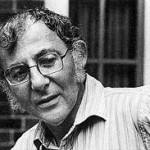Book Commentary: Thirty Years Ago Stanley Elkin Raised Hell
By Bill Marx
The ruckus kicked up by Yale University Press’s refusal to include cartoons offensive to some Muslims in a forthcoming book called “The Cartoons that Shook the World” underlines the ironic difference between offensive words and images. (Perhaps Yale U Press should re-title the censored version of the book “The Cartoons That Only Shook up the World a Little.”)
 This year marks the 30th anniversary of Stanley Elkin’s short comic novel “The Living End,” a nifty, nasty blast against the Judeo-Christian tradition. By hilariously excoriating the conventional vision of the afterlife, Elkin (1930-1995) uses his fandango-ing language to accuse God of cultivating an imagination that’s sadistic rather than sublime. Perhaps a graphic novel version of the book would raise a few hackles – Elkin’s satiric misanthropy is worthy of Twain, though it falls short of Swift.
This year marks the 30th anniversary of Stanley Elkin’s short comic novel “The Living End,” a nifty, nasty blast against the Judeo-Christian tradition. By hilariously excoriating the conventional vision of the afterlife, Elkin (1930-1995) uses his fandango-ing language to accuse God of cultivating an imagination that’s sadistic rather than sublime. Perhaps a graphic novel version of the book would raise a few hackles – Elkin’s satiric misanthropy is worthy of Twain, though it falls short of Swift.
The action in “The Living End” jumps from Heaven to Hell and back, its sardonic metaphysics revolving around the sufferings of a Job-like figure, Ellerbee, a decent man who while alive makes a few small mistakes, such as keeping his liquor store open on the Sabbath. Shot dead during a robbery, Ellerbee goes up to Heaven. But God is pissed off about the Sabbath opening, and when He hears the guy opine that paradise looks like a theme park He loses his temper. Ellerbee is promptly sent down to Hades. The hot spot turns out to be exactly as conventional wisdom would have it:
He lay down in the fire. He lay down in the slimy excrement and noxious puddles, in the loose evidence of their spilled terror. A few damned souls paused to stare at him, their bad breath dropping over him like an awful steam. Their scabbed faces leaned down toward him, their poisoned blood leaking on him from imperfectly sealed wounds, their baked, hideous visages like blooms in nightmare. It was terrible. He turned over, turned face down in the shallow river of pus and shit
After looking in on some other characters in Hell, the book shifts back up to Heaven, where Jesus, Mary, and Joseph, bored and neurotic, nurse their grudges against a self-centered God, who is none-too-happy that his handiwork is under-appreciated and over-critiqued. He never found “His audience,” He complains, creatures that give him sufficiently enthusiastic standing ovations for having doled out the gift of life.
The ending’s glorious punch line, delivered by God as He ends life-as-we-know-it, has garnered plenty of critical attention, but what stuck with me reading the book again, besides my rock-steady admiration for Elkin’s shticky word-music, is the spooky distance he creates between life and an indifferent Creator:
He is complete. He has better things to do with his time. He doesn’t accept invitations. He doesn’t go out. He stays home nights. His home is Heaven. Death is his neighborhood. Life is yours.
Some admirers of the book, such as Curtis White in his afterword to the Dalkey Archive Press edition or novelist Sam Lipsyte in an appreciation posted at NPR, work hard to posit Elkin’s humanist credentials, pointing out where characters in the book rise above despair, misanthropy, and cosmic egotism. And there are episodes where Elkin shows people tenderly connecting, though to me they skirt parody. Few characters in Elkin’s work credibly escape what the satirist sees as our Original Sin — Selfishness.

Author Stanley Elkin -- His 1979 vision of Hell remains harrowing and hilarious.
“The Living End” insists that God has left the building for “Death, his neighborhood.” It is that dank chill that stayed with me this time around, as well as the sense that God, the performer in search of a perfect audience, has cooked the existential box office returns. If mankind hasn’t the imagination or emotional capacity to love life sufficiently isn’t that God’s fault? He set the limits on our power to dream.
Elkin falls short of Swiftian satire because “The Living End” doesn’t really confront the existence of evil – people are punished in this edition of Hell but, unlike Dante, Elkin generally stays away from specifics. Is Elkin’s God a Devil because he wants us to appreciate the irrational destruction of the innocent as well as beauty? The book doesn’t go that far but it goes far enough, even after three decades, to let us share the laughter of the damned.
Tagged: Dalkey Archive Press, Heaven, Hell, Persona Non Grata, satire, Stanley Elkin

I read this as a short story “the conventional wisdom” I appreciated this commentary.